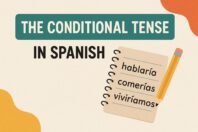Spanish Adverbs: Our comprehensive beginner-friendly guide

Get our free email course, Shortcut to Conversational.
Have conversations faster, understand people when they speak fast, and other tested tips to learn faster.
More infoSpanish adverbs can be described simply as words that we use to modify or intensify verbs, adjectives, or other adverbs. They are distinct from adjectives, which are used exclusively on nouns.
We rely on adverbs in Spanish to provide additional information on how, where, when, or how often something happened, or even whether it happened at all. Adverbs can change the tone or meaning of a sentence by softening a request, emphasizing a point, or adding more personality to speech.
Today’s lesson will focus entirely on adverbs in Spanish. We’ll start off by identifying what an adverb is, with special attention to differentiating them from adjectives. Unlike adjectives in Spanish, which need to match the gender and number of the nouns they modify, Spanish adverbs are invariable, meaning they have only one form. For many common adverbs in Spanish, we’ll see how to form them by simply adding ‑mente to their corresponding adjectives. We’ll also take a quick look at adverbial phrases.
Once we’ve seen all the basics, we’ll get into our lists of Spanish adverbs. We’ll break these down by category, basically dividing them up by what questions they answer: where, when, how many, and so on. For each group, we’ll provide a full Spanish adverbs list for each group, along with a few example sentences to see them in use.
We’ve completely updated this post to bring you a comprehensive lesson on Spanish adverbs, so you may want to bookmark it for future reference. We also include plenty of links to our other lessons, encouraging you to dig a little deeper on any of the subjects we mention today. We’ll end with a short Spanish adverbs quiz so you can see how well you’ve learned them by the end of the post.
Now let’s get started with today’s lesson on adverbs in Spanish!
Adjectives vs Adverbs in Spanish
Before we get into details on adverbs in Spanish, let’s first make sure we’re clear on what we’re talking about with adverbs. These are often confused with adjectives, so let’s compare these two grammatical categories.
Adjectives and adverbs are both used in support roles to the main idea of a sentence, which can be distilled down to a subject, a conjugated verb, and perhaps an object or two. Let’s look at a simple sentence to demonstrate this:
- main idea: Juan buys flowers for his girlfriend.
- +adjectives: Juan buys fresh flowers for his beautiful girlfriend.
- +adverbs: Juan very frequently buys fresh flowers for his extremely beautiful girlfriend.
The first sentence only has a subject (Juan), a verb (buys), a direct object (flowers), and an indirect object (his girlfriend). We’ve added two adjectives to the second sentence, both of which modify the nouns (fresh flowers, beautiful girlfriend). In the third, we’ve added three adverbs: one modifies the verb (frequently gives), one modifies an adjective (extremely beautiful), and one modifies another adverb (very frequently).
- Spanish adverbs: Juan compra muy frecuentemente flores frescas a su extremadamente bella novia.
As you can see, adverbs modify and intensify the meanings of verbs, adjectives, or other adverbs, whereas adjectives are only used on nouns. What’s more, Spanish adjective rules mean that they often change their endings to match the gender and number of the nouns (las flores frescas, la bella novia). In contrast, Spanish adverbs are invariable, since they only modify words that don’t have gender.
Let’s wrap up our adjective vs adverb comparison with a couple more examples in both languages. Take a look at how only the adjectives relate to the nouns and their genders:
- Adjective: Los niños están buenos. – The children are good.
- Adverb: Los niños se comportan bien. – The children behave well.
- Adjective: Es una película mala. – It’s a bad movie.
- Adverbs: La película está muy mal hecha. – The film is very badly made.
To be fair, even English speakers sometimes misuse adjectives vs adverbs. If it’s pointing at a noun (good children), it’s an adjective, while if it’s pointing at a verb (behaving well), it’s an adverb. We discuss such adjective-adverb differences in a lot more detail in our post on bueno vs bien in Spanish.
How to use adverbs in Spanish
Now that we’re clear on adverbs vs adjectives, let’s focus on Spanish adverbs. Since they can be used with verbs, adjectives, or other adverbs, let’s take a look at each scenario to see how we use them. In grammatical terms, we say that these words are modified by the adverbs.
Through all of our example sentences, you’ll also note that the sentence structure shows how Spanish adverbs are used very similarly to their English counterparts!
Modifying verbs
When adverbs modify verbs, they give us more information about how, when, or where an action takes place.
- Ella corre rápidamente. – She runs quickly.
- Ellos llegaron tarde. – They arrived late.
Here, rápidamente tells how she runs and tarde when they arrived, describing the manner and the time of the actions.
Modifying adjectives
Spanish adverbs can intensify, soften, or limit the meaning of adjectives they modify, helping us add precision to what we’re describing with the adjectives.
- La película es muy interesante. – The movie is very interesting.
- La casa es demasiado grande. – The house is too big.
In these examples, muy and demasiado intensify the adjectives interesante and grande.
Modifying adverbs
Some Spanish adverbs modify other adverbs to provide even more nuance to whatever the other one is modifying.
- Ellos cantan increíblemente bien. – They sing incredibly well.
- Mis hermanos llegan casi siempre a tiempo. – My brothers almost always arrive on time.
In the first example, increíblemente modifies the adverb bien, giving more detail about how well they sing. In the second Spanish adverb example, casi is added on to siempre, showing that the action occurs almost all the time, but not always.
Forming adverbs in Spanish
How do we form adverbs in Spanish? It’s easier than it looks. The ones we can consider to be regular Spanish adverbs are formed by simply taking the feminine form of an adjective and adding ‑mente. This is the equivalent of adding ‑ly to an adjective in English, where happy becomes happily, for example, the same way the Spanish translation feliz becomes felizmente.
Since this regular Spanish adverb rule is based on the feminine form of the equivalent adjective, many adjectives first require switching the final ‑o to an ‑a before adding ‑mente. For invariable adjectives, on the other hand, which generally end in ‑e or in a consonant, we just add ‑mente directly. If you’re unfamiliar with variable vs invariable adjectives, please refer to our post on Spanish adjective rules.
Here’s our first list of popular adverbs in Spanish, showing the transformation from adjective to adverb using the ‑mente rule. Notice that we always use the feminine form of the original adjective, so the first few variable adjectives end in ‑a before receiving ‑mente to become Spanish adverbs.
| Masculine adjective | Feminine adjective | Adverb, Spanish | Adverb, English |
| Claro | Clara | Claramente | Clearly |
| Exacto | Exacta | Exactamente | Exactly |
| Lógico | Lógica | Lógicamente | Logically |
| Rápido | Rápida | Rápidamente | Quickly |
| Tranquilo | Tranquila | Tranquilamente | Calmly |
| Especial | Especial | Especialmente | Especially |
| Reciente | Reciente | Recientemente | Recently |
| Suave | Suave | Suavemente | Softly |
| Total | Total | Totalmente | Totally |
- Él respondió tranquilamente a la crítica. – He responded calmly to the criticism.
- Corrimos rápidamente para tomar el autobús. – We ran quickly to catch the bus.
For more adjectives, check out our big vocab post for a list of over 100 basic Spanish adjectives in every form.
Adverbial phrases
Another way to form adverbs in Spanish is to use multi-word phrases that serve as adverbs in their own right. They are known as adverbial phrases, or locuciones adverbiales in Spanish. Just like single-word adverbs, they allow us to add detail about how, when, where, or for how long something happens.
Here are some of the most common adverbial expressions Spanish uses:
| Spanish adverbial phrase | English meaning |
| De vez en cuando | From time to time |
| Casi siempre | Almost always |
| A menudo | Often |
| En este momento | Right now, In this moment |
| Con cuidado | Carefully |
| Como mínimo | At least |
| Más o menos | More or less, About |
| Poco a poco | Little by little |
| A lo lejos | In the distance |
- Ella pudo ver el hotel a lo lejos. – She could see the hotel in the distance.
- El concierto comenzó más o menos a las diez de la noche. – The concert started at about 10pm.
Given that these constitute a class of adverbs unto themselves, we have a dedicated post that introduces numerous categories of Spanish adverbial phrases, just like we’ll do with single-word adverbs in Spanish for the rest of this post.
Lists of Adverbs in Spanish
Now that we’ve seen what adverbs are, how to differentiate them from adjectives, and how to form the most common adverbs, we’re ready to get into our big vocab lists of adverbs in Spanish. We’ll break these down into manageable groups based on the kind of information each category of Spanish adverb contributes to the sentence.
Adverbios de lugar – Adverbs of place
Los adverbios de lugar, or adverbs of place, give information about where the sentence’s action happens. Most of these are also known as prepositions.
Adverbs of place are useful for giving directions or describing locations. They usually answer questions of ¿Dónde? – Where? or ¿Hacia dónde? – Where to?.
| Spanish adverb of place | English |
| Aquí, Acá | Here |
| Allá, Allí, Ahí | There |
| Arriba | Up |
| Abajo | Down |
| Cerca | Close |
| Delante | In front, At the front |
| Dentro | Inside, Within |
| Encima | On, Over |
| Detrás | Behind |
| Sobre | On, Over |
| Lejos | Far |
| Alrededor | Around |
| Desde | From |
| Afuera | Outside |
- Por favor, deja tu mochila allá. Aquí no tenemos espacio para guardarla. – Please, leave your backpack there. We don’t have room to keep it here.
- Tu familia te está esperando adentro. Afuera no hay nadie. – Your family is waiting for you inside. There is no one outside.
Adverbios de cantidad – Adverbs of quantity
The adverbs of quantity, as the name indicates, are used to indicate amounts. They normally answer the question of ¿Cuánto? – How much? Many of these are used to make comparisons in Spanish.
| Spanish adverb of quantity | English |
| Más | More |
| Menos | Less |
| Tanto | Much |
| Nada | Nothing |
| Mucho | A lot, Very much |
| Algo | Some, A little, A bit |
| Poco | Not much, Little |
| Muy | Very, Too |
| Bastante | Enough, Quite, Too much |
| Escasamente | Scarcely, Hardly |
| Casi | Almost |
| Apenas | Barely, Hardly |
| Demasiado | Too much |
| Suficiente | Enough |
| Solamente | Only |
| Tan | So |
- Deberías estudiar más para tu examen de español. – You should study more for your Spanish exam.
- Ya casi termino mi tarea. – I am almost done with my homework.
Adverbios de modo – Adverbs of manner
Los adverbios de modo, or Spanish adverbs of manner, explain how things happen. They typically respond to the question of ¿Cómo? – How? You’ll notice that many of these are regular ‑mente adverbs in Spanish like we saw above, derived from adjectives with similar meanings.
| Spanish adverb of manner | English |
| Adrede | Intentionally, On purpose |
| Apasionadamente | Passionately |
| Bien | Well |
| Brillantemente | Brilliantly |
| Débilmente | Weakly |
| Desgraciadamente | Unfortunately |
| Fácilmente | Easily |
| Formalmente | Formally |
| Fuertemente | Strongly |
| Amablemente | Kindly |
| Así | Like this |
| Lentamente | Slowly |
| Sinceramente | Honestly |
| Estupendamente | Stupendously |
| Dulcemente | Sweetly |
| Inteligentemente | Inetlligently |
| Cuidadosamente | Carefully |
| Seriamente | Seriously |
| Mal | Badly |
| Perfectamente | Perfectly |
| Peor | Worse |
| Difícilmente | Hardly |
- Difícilmente podrás viajar sin pasaporte. – You can hardly travel without a passport.
- A él le gusta hacer ejercicio, especialmente en la noche. – He likes to exercise, especially at night.
Adverbios de tiempo – Adverbs of time
Adverbs of time indicate when something happens, relating it to the past, present, or future. They normally answer the questions of ¿Cuándo? – When? and ¿Cuánto tiempo? – How long?
These Spanish adverbs of time are useful when talking about days, months, and seasons, or when referring to the time of day.
| Spanish adverb of time | English |
| Hoy | Today |
| Mañana | Tomorrow |
| Ayer | Yesterday |
| Anoche | Last night |
| Anteanoche | The night before last |
| Anteayer | The day before yesterday |
| Actualmente | Now, Currently, Nowadays |
| Ahora | Now |
| Antes | Before |
| Después | After |
| Luego | Later |
| Todavía | Still, Yet |
| Enseguida | Immediately |
| Ya | Now, Already |
| Mientras | While |
| Brevemente | Briefly |
| Pronto | Soon |
| Temprano | Early |
| Tarde | Late |
- Voy al gimnasio mañana. – I’m going to the gym tomorrow.
- Mis primos y yo visitamos a mi abuela anteayer. – My cousins and I visited my grandmother the day before yesterday.
Adverbios de frecuencia – Adverbs of frequency
Los adverbios de frecuencia, or adverbs of frequency, indicate how often an action takes place. They are useful for describing habits and routines
These Spanish adverbs are normally used to answer questions about frequency like ¿Con qué frecuencia? – How often? and ¿Cuán frecuentemente? – How frequently?.
| Adverb of frequency | English meaning |
| Siempre | Always |
| A veces | Sometimes |
| Nunca | Never |
| Frecuentemente | Frequently |
| Usualmente | Usually |
| Normalmente | Normalmente |
| Generalmente | Generally |
| Raramente | Rarely |
| Habitualmente | Habitually |
| Ocasionalmente | Occasionally |
- Siempre desayuno temprano. – I always eat breakfast early.
- Ellos nunca viajan en navidad. – They never travel on Christmas.
Adverbios de duda – Adverbs of doubt
Los adverbios de duda, or adverbs of doubt, are used to express doubt or uncertainty about an action. They neither affirm nor deny the truth behind something.
Because they introduce uncertainty, these are classic examples of Spanish adverbs that require the use of the subjunctive mood in the verbs they modify. Check out our related posts for other Spanish subjunctive trigger phrases, an intro to the subjunctive mood, and present subjunctive conjugation rules.
| Spanish adverb of doubt | English |
| Quizá, Quizás | Perhaps |
| Posiblemente | Possibly |
| Probablemente | Probably |
- Quizás me inscriba en clases de Zumba. – Maybe I will sign up for Zumba classes.
- Probablemente vayamos a la fiesta el sábado. – We will probably go to the party on Saturday.
Adverbios de afirmación – Adverbs of affirmation
In contrast to the Spanish adverbs of doubt we saw above, los adverbios de afirmación, or adverbs of affirmation, indicate certainty about an action. They are used to reinforce a statement.
| Spanish adverb of affirmation | English |
| Sí | Yes |
| Claramente | Clearly |
| Evidentemente | Evidently |
| Indudablemente | Undoubtedly |
| Seguramente | Surely |
| También | Also |
| Totalmente | Totally |
| Ciertamente | Certainly |
| Claro | Of course |
| Exactamente | Exactly |
- ¿Esto es lo que debería hacer? Sí, exactamente! – Is this what I should do? Yes, exactly!
- Efectivamente, compraré un carro nuevo. – Indeed, I will buy a new car.
Adverbios de negación – Adverbs of denial
As the counterpart to the Spanish adverbs of affirmation we just saw, los adverbios de negación, or adverbs of denial, allow us to deny statements. These types of adverbs in Spanish are used in negative sentences.
| Adverb of denial | English meaning |
| No | No |
| Tampoco | Neither |
| Jamás | Never |
| Nunca | Never |
| Nada | Nothing |
- Yo tampoco entendí el final de la película. – I didn’t understand the end of the movie either.
- Ella jamás haría algo así. – She would never do something like that.
Conclusion: Adverbs in Spanish
We’re nearly at the end of our comprehensive lesson on adverbs in Spanish! Let’s do a quick recap before we go, and then leave you with some exercises to see how well you’ve learned your Spanish adverbs!
We started with the basics of this grammatical category. When it comes to adverbs, Spanish and English versions both do the same thing: they modify verbs, adjectives, or other adverbs. We made sure to compare these rules with adjectives, which only modify nouns.
Then we learned how to form regular Spanish ‑mente adverbs: we simply add ‑mente to their corresponding feminine adjectives, just like adding ‑ly to form many adverbs in English. We also saw a handful of Spanish adverbial phrases, showing that many short expressions can also act as adverbs.
The bulk of the post consisted of lists of common Spanish adverbs, broken down into different categories. We provided a Spanish adverbs list for each category, giving multiple options to answer questions like How?, When?, Where?, or How much?.
Mastering a variety of adverbs in Spanish is a great way to improve your language skills, while understanding how Spanish adverbs function will allow you to build natural and expressive sentences. Remember that using Spanish adverbs effectively will improve your fluency, so keep practicing and experimenting with them. Over time, you’ll notice how these small, powerful words add depth to your conversations and writing!
Adverbs in Spanish: Exercises
How many of the Spanish adverbs did you learn from today’s lesson? Why not end with some exercises to test your new knowledge on adverbs in Spanish?
Fill in the blanks with the correct Spanish adverb, referring to the English translation for guidance. The answers are below.
1. Por favor, maneja más ______. – Please drive more slowly.
2. Me siento ______ por eso. – I feel badly about it.
3. Él aprobó ______ la prueba de manejo. – He easily passed the driving test.
4. ______ te graduarás si no asistes a clases. – You will hardly graduate if you do not attend classes.
5. Compré esto ______ para ti. – I bought this especially for you.
6. Creo que he comido ______. – I think I’ve eaten enough.
7. Fuimos a un lugar ______ hermoso. – We went to an extremely beautiful place.
8. ______ están tus llaves. – Your keys are there.
9. Yo ______ tengo tiempo para ir al supermercado. – I don’t have time to go to the supermarket either.
10. Hace mucho calor ______. – It’s too hot here.
Answers
1. Por favor, maneja más despacio.
2. Me siento mal por eso.
3. Él aprobó fácilmente la prueba de manejo.
4. Difícilmente te graduarás si no asistes a clases.
5. Compré esto especialmente para ti.
6. Creo que he comido suficiente.
7. Fuimos a un lugar extremadamente hermoso.
8. Ahí están tus llaves.
9. Yo tampoco tengo tiempo para ir al supermercado.
10. Hace mucho calor aquí.



